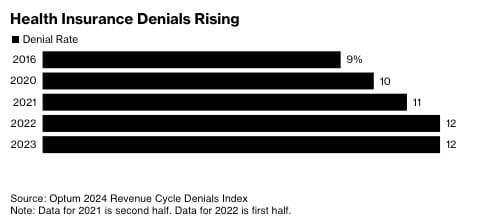March 14 2025
Underinvestment, permitting morass hampers economy; Middlemen inflate health costs; Universities cut DEI programs; Schumer supports GOP spending bill; Kremlin reconsiders ceasefire terms

U.S. Economy Stifled by Decades of Underinvestment in Housing, Energy, and Infrastructure
Administrative Middlemen Drive Up U.S. Health Care Costs by $200 Billion Annually
Universities Slash Events, Jobs as Trump Targets DEI and Federal Funding
Schumer Breaks Party Lines to Back GOP Bill, Averts Government Shutdown
Kremlin Signals Mixed Messages on U.S. Ceasefire Proposal
GET THE CITIZEN JOURNAL APP - FREE!

FLASH…SpaceX rescue mission to retrieve 2 astronauts stranded on space station for 9mo to launch today at 703p EST…
1. U.S. Economy Stifled by Decades of Underinvestment in Housing, Energy, and Infrastructure
Building physical capacity—housing, energy generation, transmission lines, factories, data centers—is more critical to the U.S. economy today than it has been for decades. After 15 years of insufficient housing construction, the lack of affordable homes is lowering the country’s annual economic output, potentially by hundreds of billions of dollars. After 25 years of stagnant investment in energy networks, an inability to meet rising electricity demands risks increased consumer costs and more frequent blackouts. And for decades, the United States has failed to properly invest in the industrial capabilities necessary to build important infrastructure, including semiconductor factories, nuclear power plants, and critical supply chains. In the process, it has ceded some technological ground to China and other adversaries at a time of intensifying global competition over new technologies. It has become too hard and too expensive to build physical things in the United States. Construction productivity has fallen 40 percent in the past 50 years, and infrastructure construction costs are now more than double the Organization for Economic Cooperation and Development average. Partly as a result, the United States is no longer a leader in many cutting-edge manufacturing industries. Regulatory challenges further exacerbate the difficulties: it takes years to complete the federal permitting process for projects requiring an environmental impact statement—the most comprehensive form of environmental review—and years in some cities to permit a multifamily housing project. In California, environmental-review lawsuits have sought to block the permitting of nearly half of all proposed housing units. Building is often mistakenly treated as a second- or third-tier macroeconomic issue. In an economy fueled increasingly by services and intellectual property, it’s commonly thought that growth and innovation are driven by advances in knowledge-based sectors. But expanding the United States’ capacity to build is not just about bricks and mortar. Making enough affordable housing, generating sufficient electricity, and supporting cutting-edge technology development are necessary for innovation and productivity growth.
[Foreign Affairs]
2. Administrative Middlemen Drive Up U.S. Health Care Costs by $200 Billion Annually
The administrative sludge that patients must slog through to get care — and doctors must wade through to get paid — drives staggering costs in US health care. The costs of billing, claims processing and prior authorizations doctors must get for treatments have soared to around $200 billion a year — about as much as the US spends to treat cancer. A raft of companies has sprung up in that morass. Some help hospitals bill top dollar for their services and navigate insurance bureaucracies. Others help insurers review claims and requests for care, and audit payments after they’ve been made. Some, including Optum, do both. Together, these little-known businesses add fresh layers of complexity and expense to an already convoluted system. “It’s like paying an arsonist to put out fire” “They’re making money on both sides and driving up the costs across the board,” Linda Blumberg, a Georgetown University expert on health insurance, said of the growing number of intermediaries in the health-care payments chain. She calls them “profit-enhancing middlemen” and says they’ve escaped scrutiny from regulators and the public. Because there’s no limit to the prices providers can charge, and little oversight of insurers’ denials, each side has turned to these companies to counter the other side’s practices.

[Bloomberg]
3. Universities Slash Events, Jobs as Trump Targets DEI and Federal Funding
A. Ohio University suspended next month’s Black alumni reunion. The University of Massachusetts revoked admission offers to biomedical graduate students. And new hiring freezes are stalling universities nationwide, from Stanford to Cornell and Harvard. After initial cosmetic steps like renaming DEI offices and scrubbing website language, schools now are making deeper, tangible changes in response to government spending cuts and President Trump’s campaign against elite universities. Schools are nixing events and rejecting previously accepted graduate students as federal funding hangs in the balance and anything perceived as “woke” becomes a no-go. Universities are closely watching the example Trump is making of Columbia University. Last week, his administration canceled roughly $400 million in federal grants and contracts to the school over antisemitism allegations. Over the weekend, Homeland Security agents arrested a Columbia student protester. The Justice Department recently said a task force will visit 10 universities, including Northwestern, Harvard and UCLA, to “bring the full force of the federal government to bear” on its bid to eradicate campus antisemitism. Meanwhile, the Education Department sent similar warning letters to 60 universities. [WSJ]
B. Johns Hopkins University, one of the country’s leading centers of scientific research, said on Thursday that it would eliminate more than 2,000 workers in the United States and abroad because of the Trump administration’s steep cuts, primarily to international aid programs. The layoffs, the most in the university’s history, will involve 247 domestic workers for the university, which is based in Baltimore, and an affiliated center. Another 1,975 positions will be cut in 44 countries. They affect the university’s Bloomberg School of Public Health, its medical school and an affiliated nonprofit, Jhpiego. [NYT]
4. Schumer Breaks Party Lines to Back GOP Bill, Averts Government Shutdown
Senator Chuck Schumer of New York, the minority leader, broke with his party on Thursday and lined up enough Democrats to advance a Republican-written bill to keep federal funding flowing past a midnight Friday deadline, arguing that Democrats could not allow a government shutdown that many of them have demanded. During a private luncheon with Democrats, Mr. Schumer stunned many of his colleagues by announcing that he planned to vote to allow the G.O.P. bill to move forward, and indicated that he had enough votes to help Republicans break any filibuster by his own party against the measure, according to attendees and people familiar with the discussion.
[NYT]
5. Kremlin Signals Mixed Messages on U.S. Ceasefire Proposal
In a shift from yesterday's reports, the Kremlin appears to be taking a more nuanced stance on the U.S.-proposed ceasefire deal for Ukraine. Initial headlines from the Financial Times suggesting an outright Russian rejection have been revised following President Vladimir Putin's press conference, where he outlined specific conditions rather than dismissing the proposal entirely. This stance is reflected in updated coverage across major outlets, with the FT and New York Times highlighting Putin's demands for Ukrainian concessions while maintaining openness to dialogue. The Wall Street Journal's opinion page, however, has taken a notably more hawkish tone with their headline "Russia Says Nyet to Trump's Ukraine Cease-Fire."
Meanwhile, behind the scenes, a potentially pivotal meeting took place between Putin and Steve Witkoff, a real estate developer serving as President Trump's personal negotiator who previously brokered the Israel ceasefire agreement. Witkoff has since departed Moscow via private jet and is returning to the United States, presumably to brief Trump on the discussions. This private meeting likely constitutes the actual negotiation process, with public statements serving primarily as political positioning. Watch Trump's statements over the coming days, which may provide crucial insights into the future trajectory of the conflict.
[Citizen Journal]
March 14, 1950: The FBI debuts “10 Most Wanted Fugitives” list
SUBSCRIBE ONLINE TO GET THE US CITIZEN JOURNAL IN YOUR INBOX - FREE!
See the Ad Astra Podcast! Released on Apple and Spotify around 10a CST.
Sponsors (click me!)










Sources
- https://www.foreignaffairs.com/united-states/why-america-struggles-build?trk=feed_main-feed-card_reshare_feed-article-content&check_logged_in=1
- https://www.bloomberg.com/news/features/2025-03-13/middlemen-in-us-health-care-are-driving-up-costs-frustrating-patients?srnd=undefined&sref=nXmOg68r
- 3A. https://www.wsj.com/us-news/education/colleges-trump-dei-funding-changes-4b60c0bb?mod=hp_lead_pos5
3B. https://www.nytimes.com/2025/03/13/us/trump-cuts-johns-hopkins-university-layoffs.html?searchResultPosition=2 - https://www.nytimes.com/2025/03/13/us/government-shutdown-senate-democrats.html
- citizen journal
